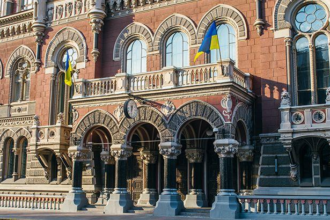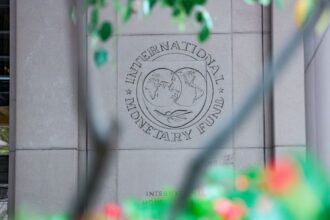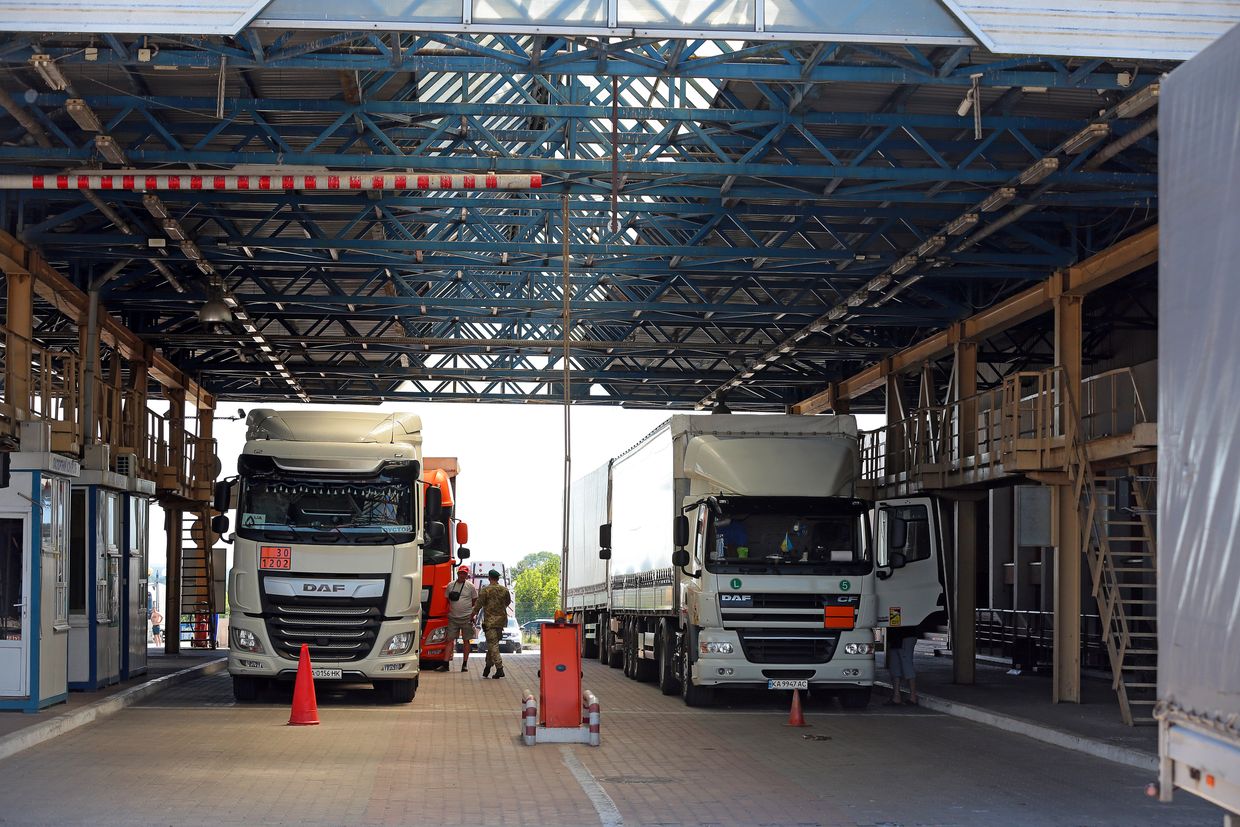On Aug. 16, 2022, a border guard is pictured at the newly renovated border checkpoint “Krakovets – Korchova”, near the village Krakovets, in Lviv Oblast Ukraine. (Pavlo Palamarchuk/SOPA Images/LightRocket/Getty Images)
Illegal smuggling costs the country billions in lost tax payments each year, at a time when the state coffers are strained to fund Ukraine’s existence.
Smugglers avoid paying customs fees by bribing or lying. They smuggle anything from cigarettes and iPhones, to perfume and food, across the border without declaring or labeling it.
The State Customs Service last year audited 9,000 cases where “humanitarian assistance” was declared and entered the country. It found that about a third of these cases were likely other goods that had been falsely labelled to avoid paying customs fees.
The lucrative nature of customs posts can lead criminals to pay large sums to secure desirable positions. Ukraine’s anticorruption bureau discovered an attempt to bribe officials earlier this year with $1.7 million to appoint three regional heads who would turn a deaf ear to illegal schemes.
“Customs may be the biggest cash cow that funnels corrupt money into Ukraine’s political system.” It’s the biggest tax-evasion scheme the country,” said Josh Rudolph. He is a senior fellow at the German Marshall Fund and the head of its transatlantic democracy group.
The State Customs Service is viewed by Ukrainians as the most corrupt government institution.
The State Customs Service has been overhauled by a new comprehensive reform bill, which was passed in the parliament as a result of increasing internal and external pressures on Ukraine. After previous reform attempts failed, increased pressure by Western partners during the conflict has given political weight to overhauling the institution.
The bill was presented to the president on September 23. It will become law after he signs the bill. However, it may take several years for its effects to be reflected in the state budget, which is desperately short of cash as the war in Russia enters its third season.
Rudolph said that corruption in customs is “a big challenge” that requires sweeping changes. This bill is a good place to start.
What the bill aims at
The bill’s most significant change is that it requires two candidates to be chosen by an independent commission for the new State Customs Service head, with half of the members being independent foreign experts.
This selection process, which reduces the possibility of corrupt influence on appointees, is modeled on successful anti-corruption measures to select heads of Ukrainian agencies.
Olena Scherban is the deputy executive director of Ukrainian nonprofit Anti-Corruption Action Center.
“You need to not only find the right people but also make sure they know how to make good decisions.”
“In some cases the rules of the (Customs Service) should be changed. But that can only be done when the head customs is not politically dependent on the people for the appointment.”
Scherban said that when the head of customs is not able to be dismissed suddenly and will not be dependent on decisions made by the Finance Ministry or cabinet of ministers, they will realize that it’s possible to be independent and bring in additional money for the state budget.
The previous attempt to reform the Customs Service in 2020 was stalled after Max Nefyodov, the then-head of service, was dismissed from his position.
Nefyodov – who was known as an effective reformer in the fight against corruption and had implemented strong transparency policies as a former deputy economy minister – accused the government for bowing to pressures from powerful smugglers calling for his removal. The government claimed that he had failed to meet revenue goals.
The bill also gives the head of the department greater independence in selecting deputies. It reduces the influence held by the finance minister. It provides for independent audits conducted by international experts.
The vetting process will examine the integrity of 9,700 current employees, as well as their financial status and sources of income. The process is expected to last several years.
Rudolph, of the German Marshall Fund, said that in the United States “personnel is the policy”. “It will be a long and challenging process, but it is important to bring in new blood, and to remove anyone who won’t be contributing to reform.”
‘We need more resources’
The economic realities of Russia’s invasion made this major overhaul urgent and possible, said Yaroslav Zelezniak, the main author of the bill and first deputy chairman of the Parliamentary Committee on Finance, Tax, and Customs Policy in Ukraine.
“We need to raise money from taxes and customs to fund our war.” Zhelezniak said to the Kyiv Independent that if something is broken you need to fix it.
He said that, “to be honest, not everyone in the government supported this, but due to the strong support of the speaker of the parliament, the head of coalition and the prime minister, we were able to push it through the parliament.”
The bill received a major boost when foreign partners included it as part of the required reforms tied to foreign aid. Ukraine must complete the customs reform by the end this month in order to meet IMF standards and secure the next round 15 billion dollar loan package from the IMF.
Zhelezniak stated that the IMF, World Bank and the U.S. had included the final version of this bill in their obligations. “The statistics for all obligations related to receiving money are very simple: 100% have been approved. There is no chance of failure when it comes to financial obligations.
Reforms are also needed for Ukraine to join the EU. This is a major goal of Ukraine, as it strives to strengthen its ties with the west. Ukraine submitted its official bid for membership in February 2022.
Igor Dankov is the customs counsellor for the Foreign Ministry of Ukraine’s Mission to the European Union.
“EU Customs administrations work as one and Ukraine’s Customs must be part of the EU Customs family.” Customs needs to be prepared to operate on the external borders of EU and strengthen its security functions. “That is why we need reform.”
Business Pressure
Major business associations also backed this bill and pressed the government to raise revenues from illegal markets, after the government raised taxes on legal businesses.
Customs reform was an effort to reduce the unpopularity caused by the first wartime tax increase in Ukraine.
“I would say this budget situation was one of the political drivers for this reform being voted on.” There is a lot of pressure from the people and businesses to not only increase tax rates, but also to work towards a more equal tax compliance and leveling the playing field. Yurii Gaidai told the Kyiv Independent that there was a lot of pressure to not only raise the tax rates, but to also work toward a more even tax compliance.
“There is a huge pressure from the people and businesses to not only increase tax rates, but to work more evenly on tax compliance and to level the field.”
“The big businesses’ pushback helped bring these new (customs) reforms to play,” he said.
Ukraine’s business community has been working towards customs reform for many years. A 2019 survey by the American Chamber of Commerce in Ukraine found that 76% of AmCham’s members believed that customs reform should be Ukraine’s top priority.
Most cited anti-corruption initiatives as the reason. The chamber surveyed hundreds members engaged in international trade, including many of Ukraine’s largest employers.
The Kyiv Independent reported that “the effective operation of customs facilitates the simplification of trade, reduces costs and delays, and enhances the overall business climate”, Vita Miroshnychenko. She is the head of customs, international trade and PwC Ukraine, and a cochair of AmCham.
She added that during wartime, efficient customs work facilitates the movement of humanitarian aid as well as defense goods.
Only a first move
It will take some time before you see any results after the president signs the new law. The law allows for a selection panel to be formed in two months and for re-certifications up to three years.
“Even if everything goes as quickly and well as it can, I wouldn’t expect to see any fiscal results for the next budget year,” Gaidai of CES said.
Gaidai stated that “if it is done properly, then we can expect a decrease in tax revenue at first.” “Because the previous government was sabotaged by corrupt people every time they tried to reform the Customs Service.”
Scherban of AntAC said that sabotage or undue influences are possible again. But there is a simpler solution — finding talent in a war-ravaged population.
In other competitions that are structured similarly for high-ranking officials, “we find a lack of genuine candidates who want to apply and trust the reforms, due to the war.” Scherban said that “many talented professionals go into the Armed Forces”.
“The most important, crucial thing is the successful selection of the new head for the Customs Service. All procedures, recertification and so on depend on the new head. We will be monitoring the process closely,” said Scherban.
Zhelezniak, citing similar reforms in other Ukrainian institutions, noted that the signing of the law could still be a powerful sign of change, forcing employees to adapt their expectations and behaviors.
Zhelezniak added that this is only the first of many steps. He plans to continue to work on future reforms to digitize the agency, to reduce the chances for human interference, to bring the agency closer to EU customs requirements and to secure the budget needed to increase salaries and attract better talents.
Zhelezniak stated that “customs is not a technocratic reform.” “It is not a case where you implement a new process or a new department and solve the problem. There are thousands of border guards who have to perform their duties every day and every hour. “There is no way to reduce corruption or make it go away without changing the mindsets and approaches of these individuals.”
Read More @ kyivindependent.com




